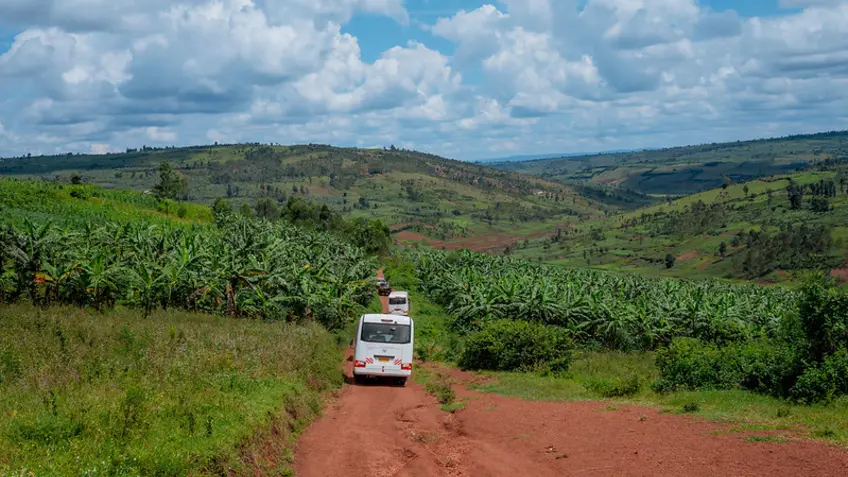Mobilizing Climate Finance in Rwanda
Programmatic Approach to Climate Action
Rwanda’s commitment to climate action is reflected in its shift toward a programmatic approach. This shift involves moving away from isolated, short-term climate projects toward larger, integrated programs designed to deliver long-term, sustainable impacts.
With this shift, Rwanda aims to leverage climate funds, private sector investment, domestic revenue and innovative financing mechanisms to ensure the impact and sustainability of its climate actions.
Recognizing the value of financing larger programs over smaller projects, the Ministry of Environment, Ministry of Finance and Economic Planning and the Rwanda Green Fund (FONERWA) are working together to institutionalize this new approach. The Ministry of Finance and Economic Planning has integrated programmatic investment planning into the National Investment Policy, reinforcing this shift at a policy level.
Rwanda’s programmatic approach also aligns with its revised Green Growth and Climate Resilience Strategy (GGCRS) and Vision 2050, which aims to transform Rwanda into a high-income, carbon-neutral, and climate-resilient economy by 2050.
The GGCRS, which outlines adaptation and mitigation actions in line with Rwanda’s updated Nationally Determined Contributions (NDCs), focuses on four core areas: sustainable land use and natural resource management, green Industrialization and trade, green urban transition and integration and vibrant resilient green rural livelihoods.
Rwanda has identified agriculture and urban development as strategic priorities for its programmatic approach. In agriculture, Rwanda is focused is on climate-smart farming, rural entrepreneurship and stormwater management. In urban areas, Rwanda envisions climate-resilient cities supported by sustainable planning and green infrastructure.
Implementing this strategy is projected to require an investment of USD 2 billion annually through 2050. In collaboration with the NDC Partnership, Rwanda created an implementation framework to address its USD 6.5 billion funding gap, requiring about USD 1 billion annually through 2030. The Ministry of Environment, Ministry of Finance and FONERWA are also developing investment plans that align with GGCRS priorities. Successful pilot projects, such as the Volcanoes Community Resilience Project and Green Gicumbi Project, serve as blueprints for future initiatives.
At COP28 in Dubai, Rwanda presented its investment plans based on GGCRS pillars, showcasing the country’s progress and calling for greater global action.
The Taskforce on Access to Climate Finance
Rwanda plays a pivotal role in the Taskforce on Access to Climate Finance convened by the UK and Fiji at COP26 in Glasgow. The Taskforce is working to shift climate finance from project-based to programmatic approaches that align with national plans. This model is being trialed in several countries, including Bangladesh, Fiji, Jamaica, Mauritius, Rwanda, Somalia and Uganda, with recommendations and principles introduced at COP26 to address the needs of least developed countries (LDCs) and Small Island Developing States (SIDS).
Rwanda and the NDC Partnership
As NDC Partnership Co-Chair, Rwanda provides political leadership, guidance and oversight to elevate and direct the collective work of the membership.
Since joining the NDC Partnership in 2018, Rwanda has engaged the NDC Partnership to fast-track its climate goals. In support of the Taskforce, with funding from Germany, the Partnership deployed a coordinator to facilitate collaboration and ensure effective programmatic investment planning. Through the Partnership Action Fund (PAF), an Investment Advisor is embedded in FONERWA to develop investment programs, while a national In-Country Facilitator is stationed at the Ministry of Environment to coordinate climate efforts, facilitate resource mobilization and report on progress toward NDC targets.
Rwanda’s leadership in the NDC Partnership and Taskforce, coupled with its programmatic approach, cements its position as a global leader in sustainable development. By chairing critical climate discussions at COP and other international fora, Rwanda stands as a model for implementing comprehensive solutions to climate challenges.
For more information on climate action in Rwanda, including the latest country documents, please visit the Rwanda country page on the NDC Partnership website.
Cover photo: robnaw / Adobe Stock
